
Coffee Sweetener Alternatives Worth Considering
A spoonful of sugar in your morning brew may not be as bad for your health as you think. Though sugar often gets a bad rap, registered dietitian Andy DeSantis says that a bit of sugar in your coffee is likely fine—so long as you’re not over-consuming the sweetener during the rest of your day. “If you’re using a small amount in the morning,” he says, “your tastes should dictate your choice more than anything else.”
But what if you’re somebody who dumps six tablespoons of sugar into each cup of joe, or reaches for a bag of candy each afternoon? Diabetes Canada recommends Canadians limit their sugar intake to less than 10 per cent of their total daily calories—approximately 50 grams (12 teaspoons) of sugar per day, based on a 2,000-calorie diet. Meanwhile, it’s estimated that most Canadians consume more than twice that amount, at 110 grams of sugar per day.
“At the end of the day, sugar does not have any health benefits,” says registered dietitian and nutritionist Stefanie Senior. “When you’re consuming sugar on a regular basis, depending on how much that is, it can be a health risk.” Cutting sugar from your morning (or afternoon) coffee can be an easy way to lower your sugar intake—or simply experiment with new flavours. Here are 10 tasty coffee sweetener alternatives worth considering.
Sign up to our Health Report newsletter for more expert advice on prevention, wellness and nutrition—delivered straight to your inbox!
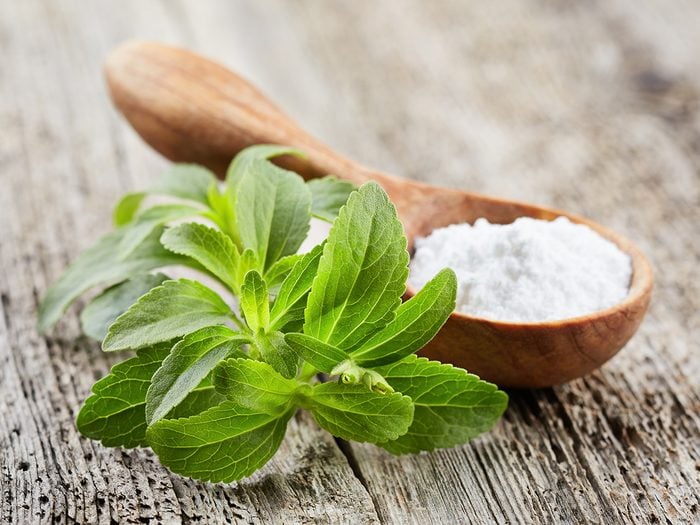
Stevia
Stevia is a zero-calorie, zero-carb sweetener extracted from the leaves of the stevia plant. While some people find stevia tastes bitter, it’s actually 100 to 300 times sweeter than sugar—allowing you to use less of it and get the same coffee sweetener kick, says De Santis. Stevia may also assist in blood sugar regulation for people with diabetes, according to a 2016 study from the National Center for Biotechnology Information. Plus, it won’t rot your teeth like sugar does: According to a 2017 study from the African Journal of Food, Agriculture, Nutrition and Development, stevia actually helps prevent tooth decay. Your dentist—and your smile—will thank you!
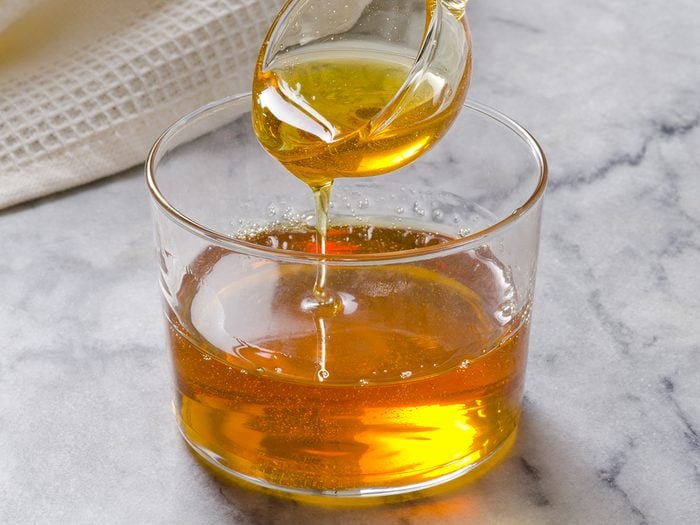
Agave
Derived from the blue agave plant, this thin, honey-like syrup is lower on the glycemic index and won’t spike your blood sugar levels as much as sugar, says Senior. According to a 2019 study conducted at the National Center for Biotechnology Information, agave nectar also contains rich amounts of vitamin B6, which has been shown to contribute to your heart health. While agave is technically still considered “free sugar”—a sugar removed from its original source and added to food as a sweetener—its added benefits make it a worthy alternative. “If I wanted to sweeten my coffee, I would definitely sweeten it with agave over white table sugar,” says Senior.
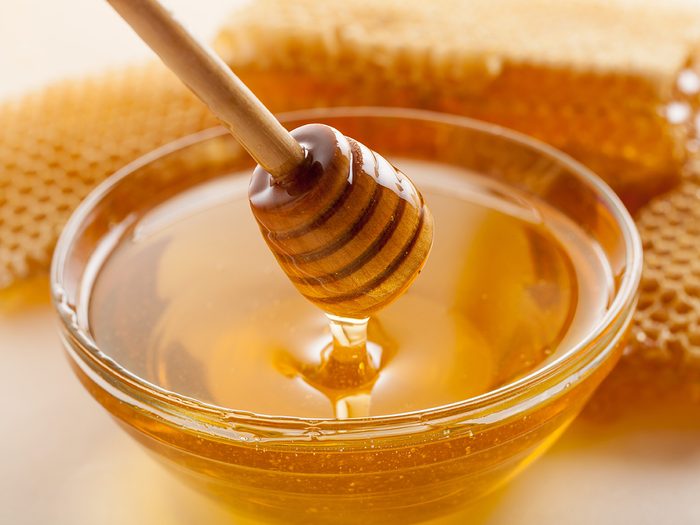
Honey
Honey isn’t just for tea. Like stevia, honey is also sweeter than sugar—meaning you can use less and get that same sweet taste, says Senior. Even better: an observational study of 4,500 participants conducted in 2020 by the National Center for Biotechnology Information associated moderate honey consumption with a decreased risk of high blood pressure. However, Senior says coffee drinkers should still be cautious of the amount they’re using. As another “free sugar,” honey shouldn’t come with a green light to squirt as much into your coffee as you want. Keep your sweet tooth in check and don’t overuse it!
Discover more natural remedies for high blood pressure.
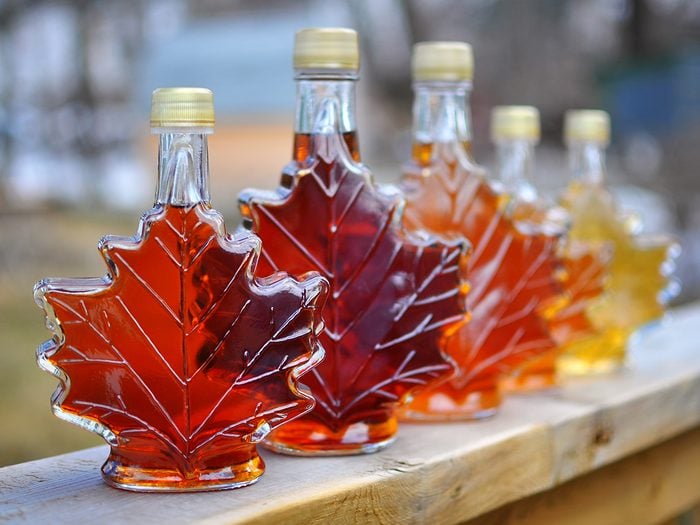
Maple syrup
Straight from the sap, natural maple syrup is an excellent sugar alternative to sweeten your coffee. Maple syrup contains antioxidants that may help regulate gastrointestinal issues and inflammatory bowel diseases. “People with IBS might even tolerate maple syrup more than honey,” DeSantis says. Because maple syrup is a soluble fibre it can help soften your stool and speed up the time it takes to make a deposit at the porcelain bank. Consider also that coffee can prompt your body to release gastrin and cholecystokinin, two hormones that can further stimulate the body to stool.
Find out more healthy eating habits for better bowel movements.
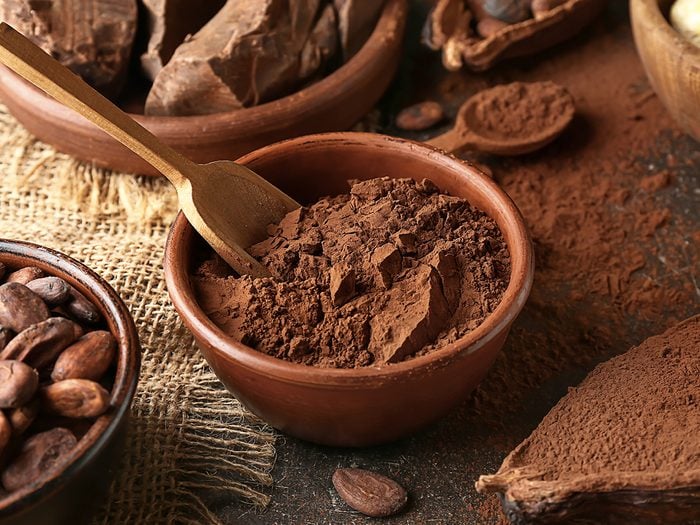
Cocoa powder
Who says that chocolate is bad for you? Natural cocoa powder is a rich source of fibre, iron and calcium. According to a 2011 study from the National Center of Biotechnology, natural cocoa powder is also high in phenolics, which help to regulate inflammation, make your immune system happy and keep your stress levels low. “Cocoa is high in antioxidants, and it doesn’t have any sugar,” adds Senior—giving you your chocolate fix without plenty of extra calories. Just drop in a tablespoon and enjoy your coffee (or rather, your café mocha).
Here are 18 more foods that fight inflammation.
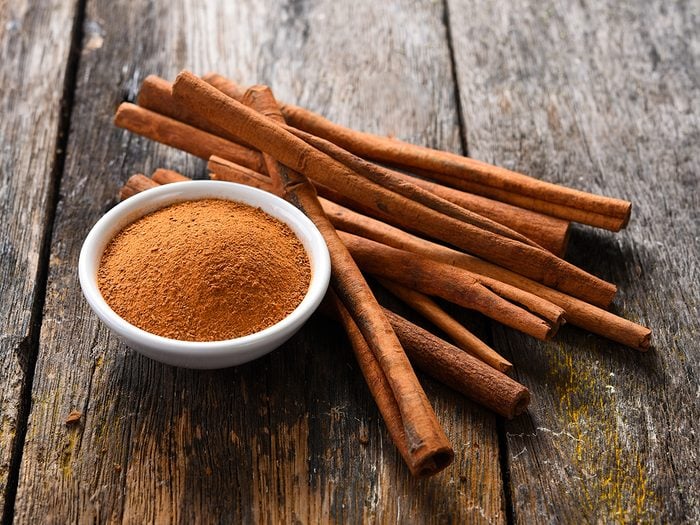
Cinnamon
Putting cinnamon in your coffee is a great way add healthy minerals to your diet, says De Santis. For example, cinnamon contains high amounts of potassium, which helps to counteract sodium intake. If you have type 2 diabetes, adding this sweet, woody flavour into your cup of joe might also be for you. A 2019 study from the National Center for Biotechnological Information suggests that cinnamon has anti-diabetic effects because it can inhibit gastro-intestinal enzymes and help modulate insulin response and sensitivity.
Don’t miss this expert advice on how to beat diabetes.
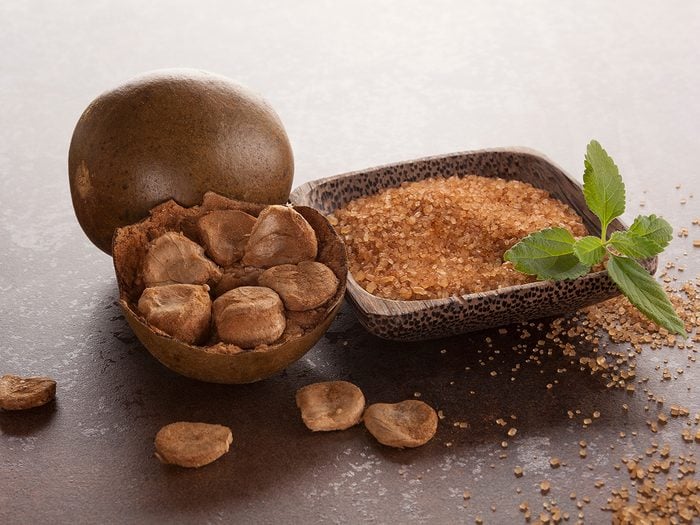
Monk fruit
Monk fruit is a herbaceous perennial vine that will give your coffee a sweet, fruity burst of flavour. Monk fruit is 250 times sweeter than sugar and, according to De Santis, “people tend to enjoy the flavour of monk fruit more than the somewhat-bitter aftertaste of stevia.” Monk fruit gets its sweetness from an antioxidant called mogrosides, which can help prevent cancer and stabilize blood sugar levels. Adding monk fruit to your coffee is also a great way to incorporate vitamin C into your diet, an essential vitamin for maintaining a healthy immune system.
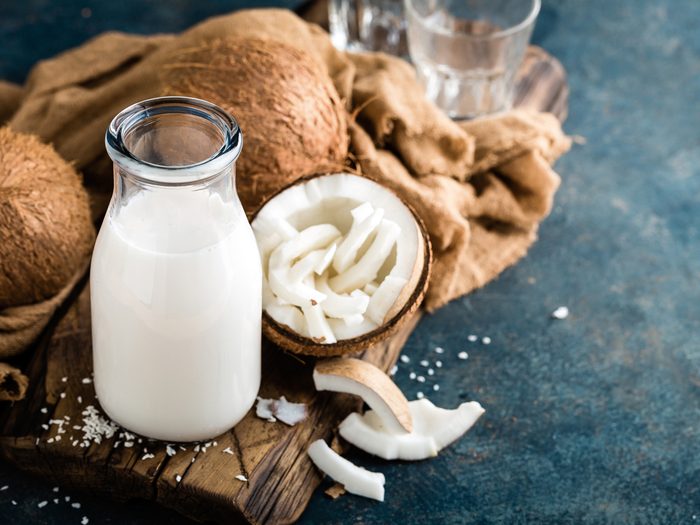
Coconut milk
Adding this light, sweet and nutty base to your coffee is a great way to give your rocket fuel a velvety smoothness without the extra cholesterol and sugar that you’d get from cow’s milk. “Depending on the brand, coconut milk has four grams of sugar, whereas cow’s milk has 12 grams of sugar,” says Senior. “So, for people who are concerned about sugar and insulin levels it has a benefit.” Coconut milk also contains beneficial fatty acids: A 2013 study found that coconut milk is a healthy source of saturated fat that can decrease bad cholesterol and increase good cholesterol. Senior adds that it’s best to choose a brand of plant-based milk that is fortified with B-12 and calcium to ensure you’re feeding your body healthy minerals.
Learn to spot the signs you’re not getting enough calcium.
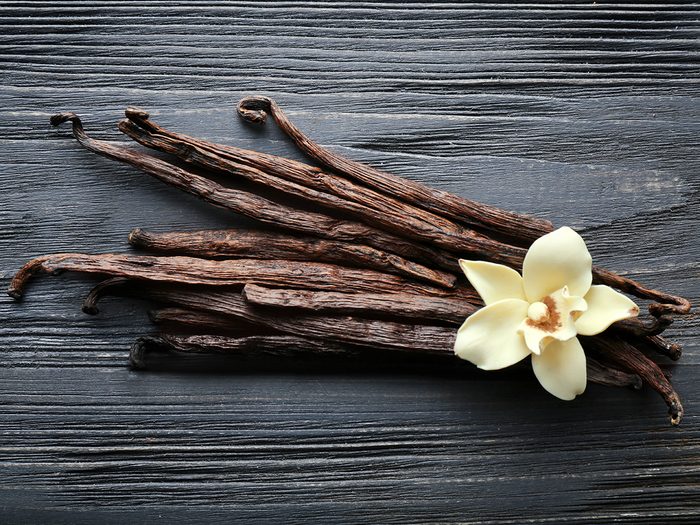
Vanilla
If you buy vanilla in bean pod form, you’ll want to cut the bean vertically in half and then scrape the inside to remove the beans. Plop those bad boys into your cup and give it a stir to add a sweet, buttery flavour to your coffee. “When people are flavouring their beverages, they may not be as likely to add in things like cream and sugar,” says Senior. “So, it might help them to cut back on those calories—and definitely the sugar.” Plus, a Nutrition Today study found that vanilla is excellent for reducing gastrointestinal stress.
Find out more ways to improve gut health.
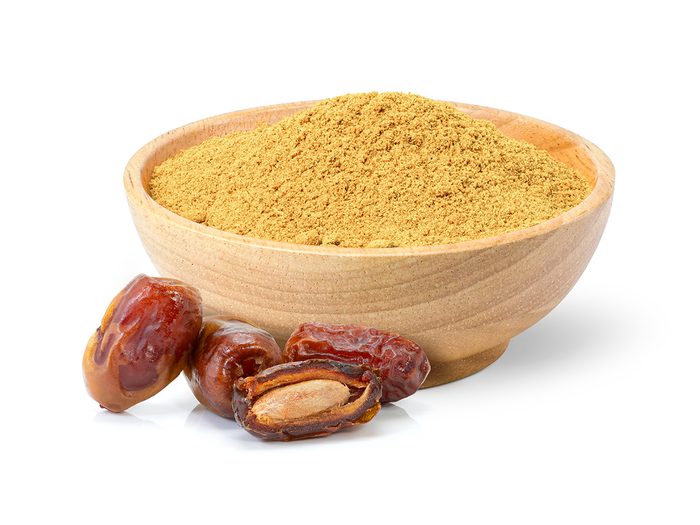
Date sugar
Date sugar is made from granulated, dried dates. Using date sugar as a coffee sweetener will give your coffee a fruity, butterscotch-like flavour. Although dates are jam packed with natural sugar, they are also a cholesterol-free product with a low-glycemic index. Date sugar is also a great source of fibre, which helps keep you full and, in turn, can help reduce blood sugar spikes, says Senior. Fibre that is also great for your microbiome, the genetic material of the microbes that live inside the body, adds Senior.
Ready to sample these great coffee sweetener alternatives? Try them out with fresh beans from the best coffee roasters in every province.